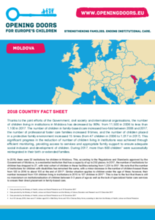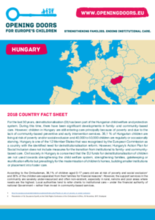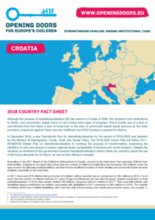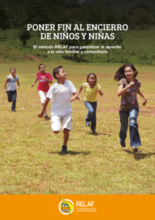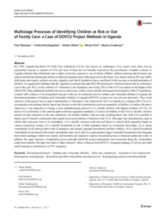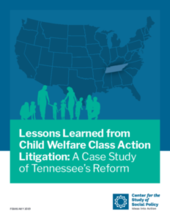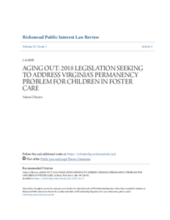Displaying 371 - 380 of 1025
This factsheet highlights the developments and challenges still ahead in Moldova and offers key recommendations to the EU and the national government to ensure that children are cared for in family-based settings.
This factsheet highlights the developments and challenges still ahead in Hungary and offers key recommendations to the EU and the national government to ensure that children are cared for in family-based settings.
This factsheet highlights the developments and challenges still ahead in Croatia and offers key recommendations to the EU and the national government to ensure that children are cared for in family-based settings.
El objetivo de este documento es identificar y transmitir las características del método que ha empleado RELAF para generar la adecuación de los subsistemas de protección integral de derechos de los niños privados de cuidados familiares o en riesgo de perderlos, haciendo énfasis en procesos de desinstitucionalización.
This open access paper documents the Deinstitutionalization of Orphans and Vulnerable Children in Uganda (DOVCU) project, articulating the logical steps that were undertaken to identify districts, Child Care Institutions (CCIs), Remand Homes (RH), sub-counties, and parishes to work with. It also seeks to categorically outline the inclusive process that was used to examine push and pull factors of family-child separation, identify households at risk of family-child separation “prevention households,” identify reunifying children and trace their households “reintegrating households,” and assess and classify in quantified terms the level of vulnerability in both at risk and separated households.
This study is based on a review of the documented history of Tennessee’s child welfare reform and informed by the reflections and perspectives of many who played key roles in the litigation and related system improvement efforts.
This article by staff attorney for family law and child welfare at the Virginia Poverty Law Center's Center for Family Advocacy, Valerie L’Herrou, outlines and analyses several new bills introduced by the Virginia General Assembly in 2018 and their impacts on young people aging out of the foster care system and family reintegration.
This short human rights in action article takes a critical approach to the translation of policy to practice and highlights risks involved with haste, outcomes measured in numbers and unrealistic timeframes, and rapidly transforming practice with nascent investment in a country’s capacity to assess and respond to the real needs of children and families within their communities.
This chapter of the Routledge Handbook of Critical Social Work, written by David Tobis, examines an inspiring story of dramatic change in New York’s child welfare system and how parents whose children were in foster care contributed to those changes. It demonstrates how grassroots activism can be suggestive for critical social work.
This field guide, produced by Apolitical in partnership with Hope and Homes for Children, is designed to help public servants understand the issue of children in care. It covers the following learning objectives: (1) Understand why experts say institutional care is harmful to children, (2) Learn about deinstitutionalisation and new approaches to replace institutions and prevent family separation, and (3) Learn about interventions that have improved outcomes for kids who do experience care.

